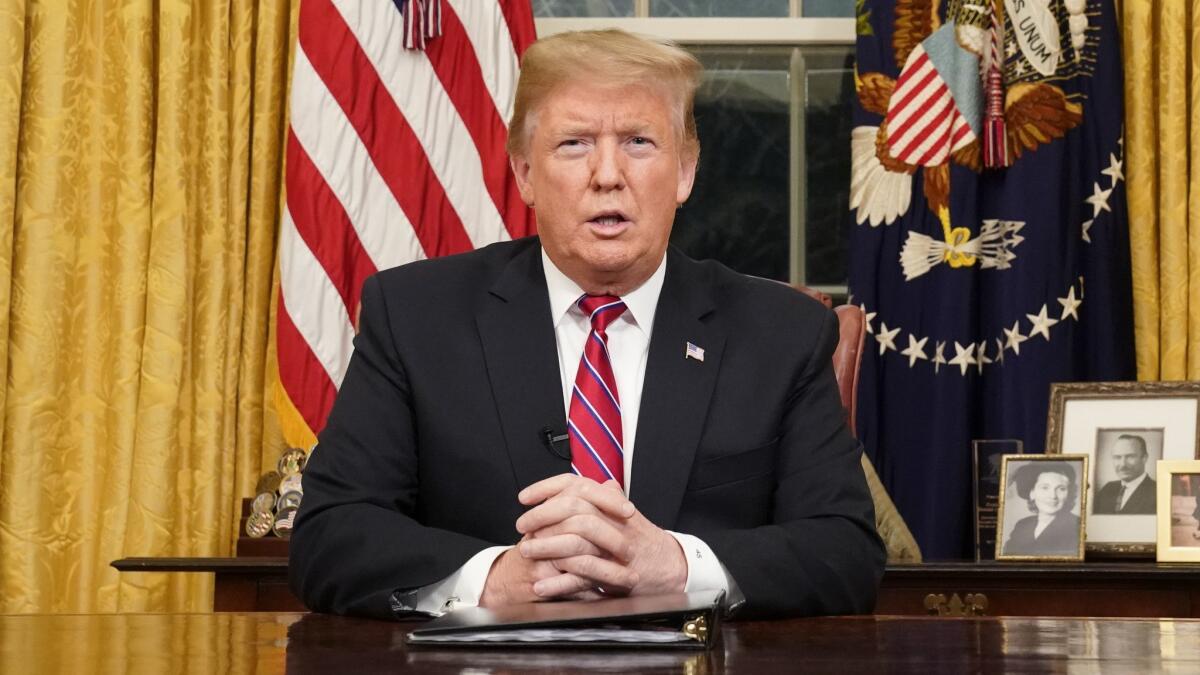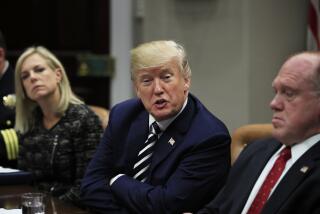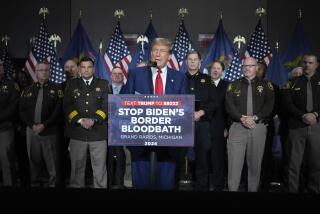Trump takes wall fight to American public with prime-time TV address

President Trump took his disputed claim of a national security crisis at the southern border directly to the American people on Tuesday night, for the first time speaking from the Oval Office in prime time to try to enlist public support for $5.7 billion for his long-promised wall.
“There is a growing humanitarian and security crisis,” Trump said in a 10-minute address, sitting at his familiar desk. He added, “All Americans are hurt by uncontrolled illegal migration.”
Constructing a steel barrier, as he called it, is “absolutely critical to border security. It’s also what our professionals at the border want and need,” Trump said.
With his speech, the president aimed to put pressure on his Democratic opponents — but his more immediate problem is the need to shore up support among Republicans. Even before Trump spoke, that backing seemed to be eroding, with several Republican senators calling for an end to the shutdown regardless of funding for the wall.
Moments after Trump’s speech, House Speaker Nancy Pelosi of San Francisco and Senate Minority Leader Charles E. Schumer of New York delivered a televised rebuttal, complaining that the president was manufacturing a crisis to stoke fear, as they made the case for reopening the government before any negotiations about border security.
The president stopped short of declaring the national emergency he’s spoken of in recent days, which he’d said would allow him to bypass Congress and tap existing funds for a wall. He also steered clear, after days of criticism, of repeating some of the false claims he has made that thousands of terrorists were crossing the border.
To broaden his case, Trump depicted a wall as just one of a package of responses to the problem at the border, including more money for agents and for facilities to screen and detain migrants, many of whom are women and children.
But as he often does at political rallies, the president vividly described a few violent crimes allegedly committed by people who are in the U.S. illegally.
“To those who refuse to compromise in the name of border security,” he said, “I would ask: Imagine if it was your child, your husband, or your wife whose life was so cruelly shattered and totally broken?”
His address came as part of a public relations offensive intended to break a standoff with lawmakers that has blocked funding for about a quarter of the government, keeping affected agencies closed since Dec. 22 for the longest such shutdown since 1996. By Saturday, if unresolved, it will surpass that record.
The impasse has left about 800,000 workers without paychecks this week, though about half must still report for work. It has closed popular national parks and left others opened but ill-attended and filling with trash. Real estate closings, farming plans and other businesses that depend on federal offices have been disrupted, reflecting the increasing number of disrupted services reliant on the government.
Trump has argued, despite polling to the contrary, that federal workers and other Americans would accept any such sacrifices, given their support for his stand for a border wall to keep the country safe.
Apprehensions at the southern border have been declining for two decades, and no terrorists are known to have crossed it.
Democrats and advocates who favor less restrictive immigration policies dispute that a crisis has ensued. There is some agreement on the humanitarian imperatives, including the need to spend more money on immigration judges and other officials needed to process refugee claims that have piled up, in part because of administration policies discouraging such claims. Democrats also have called for investigating detention centers at the border after the recent deaths of two migrant Guatemalan children in U.S. custody.
Days after Democrats assumed control of the House last week amid the standoff, the White House on Monday hurriedly arranged the Oval Office address as Trump has tried to dominate the debate this week. He also sent Vice President Mike Pence on a series of interviews with network news reporters on Tuesday morning. Trump and Pence are expected to meet with Republican senators at the Capitol on Wednesday, and Trump plans to go to the border in McAllen, Texas, on Thursday.
The president predictably sought to lay blame for the impasse on Democrats. “The federal government remains shut down for one reason and one reason only — because Democrats will not fund border security,” he said.
Pelosi noted that Trump had rejected bipartisan bills in the Senate and House to reopen government “over his obsession with forcing American taxpayers to waste billions of dollars on an expensive and ineffective wall — a wall he always promised Mexico would pay for.”
Schumer added, “The president just used the backdrop of the Oval Office to manufacture a crisis, stoke fear and divert attention from the turmoil of his administration.” He said Democrats were not opposed to spending for border security, but only for the wall.
Democrats, who have not been willing to approve more than $1.3 billion in additional border security funding, haven’t budged during the 18-day standoff.
Pelosi and Schumer had demanded the television networks allow them time to respond. The dueling speeches gave the evening the air of a State of the Union address, an annual event that is scheduled for Jan. 29. Presidents since Harry S. Truman have delivered prime-time Oval Office addresses, typically at moments of domestic or international significance, but Presidents George W. Bush and Barack Obama disliked the format and used it rarely as technology has given Americans more viewing and entertainment options.
Trump, who is most comfortable criticizing immigration at a rollicking rally, seemed muted and discomfited as he narrowed his eyes to read from the TelePrompTer. Pelosi and Schumer, standing beside each other stiffly, looked no more at ease than the president.
The battle over a wall has become a defining political test for Trump and — with the president for the first time forced to share power with congressional Democrats — it has set an especially combative tone for the final two years of his term. He promised repeatedly during the 2016 campaign to build a wall across the 2,000-mile border with Mexico, while also insisting improbably that Mexico would pay for it.
In his address Tuesday, the president repeated his claim that Mexico in effect would pay for the wall through increased trade resulting from the recently renegotiated North American trade agreement with Mexico and Canada — an assertion that many experts and fact-checkers have derided.
Even many of Trump’s conservative allies in the immigration fight have put a low priority on building a wall, but the president has suggested that he will keep the issue at the center of his reelection battle in 2020.
“Your safety is not a political game or a negotiation tactic!” Trump wrote in a fundraising email to supporters on Tuesday, hours before the address. “Please make a special contribution of $5 by 9 p.m. EST to our Official Secure the Border Fund to have your name sent to me after my speech.”
The showdown over the wall began last month in the final days of Republicans’ two-year hold on Washington’s levers of power — the White House, House and Senate. Congressional Republicans, a number of them unenthusiastic about Trump’s signature cause, did not press hard for his funding requests in that time, and Senate leaders have not lent him vocal support lately.
Indeed, about half a dozen Senate Republicans — including several facing reelection battles next year — indicated they wanted the president’s showdown to end even without money for a wall. On Tuesday, Sens. Shelley Moore Capito of West Virginia and Lisa Murkowski of Alaska called for reopening the government, joining others including Sens. Cory Gardner of Colorado, Thom Tillis of North Carolina and Susan Collins of Maine who’ve signaled opposition to an ongoing shutdown.
Yet so far, neither the president nor congressional Democrats have been willing to give in.
Trump has been hounded by conservative media allies to keep up the fight, even as Republicans in Congress have tried to move on.
Democrats, emboldened by their new majority in the House as well as Trump’s declarations a month ago that he would take responsibility for a shutdown, believe they have the leverage and have been unwilling to yield. They have supported money for border barriers in past years’ immigration compromises but now see the issue as politically toxic to their anti-Trump voters.
Polls have shown that most Americans blame Trump for the shutdown. One survey over the weekend by Morning Consult and Politico found a plurality of 42% of Americans agree with Trump that there is a crisis on the border, yet 47% blamed him for the shutdown and 33% blamed congressional Democrats.
Trump, however, has largely focused on his supporters in governing, and polls show the vast majority of Republicans continue to take his side, reducing his appetite for compromise.
For Democrats, a prolonged battle over the president’s immigration platform could hamper their ability to present an alternative governing agenda over the next two years. They have, however, largely coalesced behind Schumer and Pelosi.
In the Senate, Democrats on Tuesday blocked an unrelated bill that Senate Majority Leader Mitch McConnell (R-Ky.) sought to bring up for a vote, demanding that he first let senators vote on House-passed bills to end the shutdown. They are considering filibustering other legislation as well until McConnell relents.
“The New Democratic majority in the House of Representatives did their job and made opening the entire government the first order of business when they passed two measures to achieve that goal,” the four senators from Virginia and Maryland — home to many federal employees but fewer than California — wrote in a letter to fellow Democrats. “Republican leader McConnell should immediately bring those bills to a vote in the Senate.”
House Democrats plan to hold votes this week on similar bills to restore funding for portions of the government that are closed, such as the Interior Department, which oversees national parks, and the Treasury Department, which oversees tax refunds. Those votes could put additional pressure on Republicans.
Times staff writer Sarah D. Wire contributed to this report.
Follow the latest news of the Trump administration on Essential Washington »
Twitter: @noahbierman
Twitter: @elistokols
jennifer.haberkorn@latimes.com
Twitter: @jenhab
More to Read
Get the L.A. Times Politics newsletter
Deeply reported insights into legislation, politics and policy from Sacramento, Washington and beyond. In your inbox three times per week.
You may occasionally receive promotional content from the Los Angeles Times.









